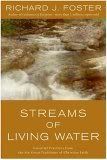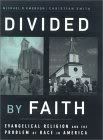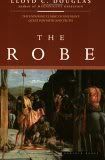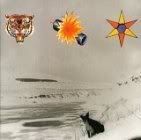 I'm reading Richard Foster's book Streams of Living Water: Celebrating the Great Traditions of Christian Faith right now, and just loving it.
I'm reading Richard Foster's book Streams of Living Water: Celebrating the Great Traditions of Christian Faith right now, and just loving it.
He begins by looking at Jesus as the perfect embodiment of all of the streams of spiritual life, and then goes into a discussion of each of the traditions. The format is excellent, each chapter beginning with three short biographies - one historical, one biblical, and one contemporary - that exemplify the tradition, or 'stream'. He then moves to defining the tradition, identifying the strengths as well as outlining some of the 'potential perils', always careful to note that the weaknesses aren't intrinsic to the tradition itself, but result from perversions of it. Finally, there is a section on practicing the tradition, with practical suggestions for ways in which to incorporate some of the ideas into daily life.
The traditions he discusses are:
- The Contemplative Tradition: The Prayer-Filled Life
- The Holiness Tradition: The Virtuous Life
- The Charismatic Tradition: The Spirit-Empowered Life
- The Social Justice Tradition: The Compassionate Life
- The Evangelical Tradition: The Word-Centered Life
- The Incarnational Tradition: The Sacramental Life
I like the way he draws attention to the overlaps between the streams, and calls us to seek a more holistic spirituality that draws on the strengths of them all. Also, the stories of the people he chose were interesting, inspiring, and sometimes, well, shocking. Some of the ascetic practices that people have done historically are just a little gross. And some seem almost unreal - the healing ministries of people like St. Anthony, the working of the Spirit in the Azusa Street Mission of William Seymour, the ability of John Woolman to nearly single-handedly overturn the practice of slavery for the Quakers with the force of his convictions and character. They all scream off the page at me, "Behold, the power of God."
At the end of the book he includes two very helpful appendices. One is a brief history outlining the 'critical turning points in church history'; the other is a list with short, one paragraph, descriptions of many notable figures and significant movements in church history, and identifies which tradition they are most strongly associated with.
In sum, a very helpful book, with stories both inspiring and convicting. It compels the reader to look again to Jesus, the author and perfecter of our faith (Heb 12:2), as a model for our lives. It also highlights the need to, as Greg often says, move away from the ambiguity of spirituality of our time and return to a spirituality rooted in scripture, an exciting, dynamic life lived holistically within the world, not somewhere apart from it. As Martin Marty says in the foreword, “Having a mooring at that source does not mean getting to stay at home while the winds would blow into the sails. It means knowing where the lighthouses and beacons are, where the harbor is into which to return for momentary retreat before the next sailing forth into the turmoil of the world.”










1 comments:
Thanks for the review. It sounds like a wonderful book and I can't wait ti get it and start reading!
Mom
Post a Comment